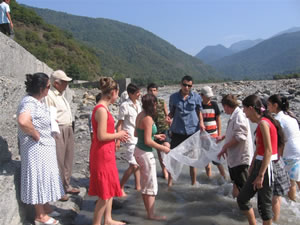River Basin Serves as Classroom for Environmental Education
Until this summer, high school students in the town of Belokan, Azerbaijan on the country’s border with Georgia, never knew that spending a bright summer day on the river can be not only fun, but also a scientific experience.
In August 2007, 30 students and their geography and biology teachers were invited by environmentalists from the non-government organizations Ecological Society Ruzgar (Azerbaijan) and CENN (Georgia) to learn about biomonitoring, and to take part in the practical examination of ecological conditions in local rivers.
 |
| Teenagers collect water samples from the Alazani River, and make inferences about the water quality based on the catch of the day |
Ruzgar and CENN demonstrated how the variety of species living in the river changes depending upon the pollution level. The environmentalists prepared a matrix listing names and pictures of species demonstrating how their existence was tied to the quality of the river water.
The USAID South Caucasus Water Program funds this grant activity and a suite of others dedicated to improving community-based stewardship for the Alazani (Ganikh) River. Grantees Ruzgar and CENN are working together to raise public awareness about water quality with the Georgian and Azeri villages in the watershed. The project pays particular attention to the environmental education of the younger generations.
“Working with teenagers is a challenge. One has to be creative to attract children during summer holidays to have them learn and discuss environmental issues and make them understand the importance of their own role in the protection of surrounding nature.” said Dr. Islam Mustafayev, Ruzgar Project Coordinator.
In addition to presenting principles of biomonitoring and the importance of local environmental stewardship to the students, teachers and local authorities, Ruzgar and CENN highlighted how the Alazani River is important as a shared water resource between two countries. Azeri teenagers also learned that problems of shared water resources are beyond borders affecting everyone in the region; and that only by combining efforts can the river’s water quality be improved.
Back to Top ^ |


